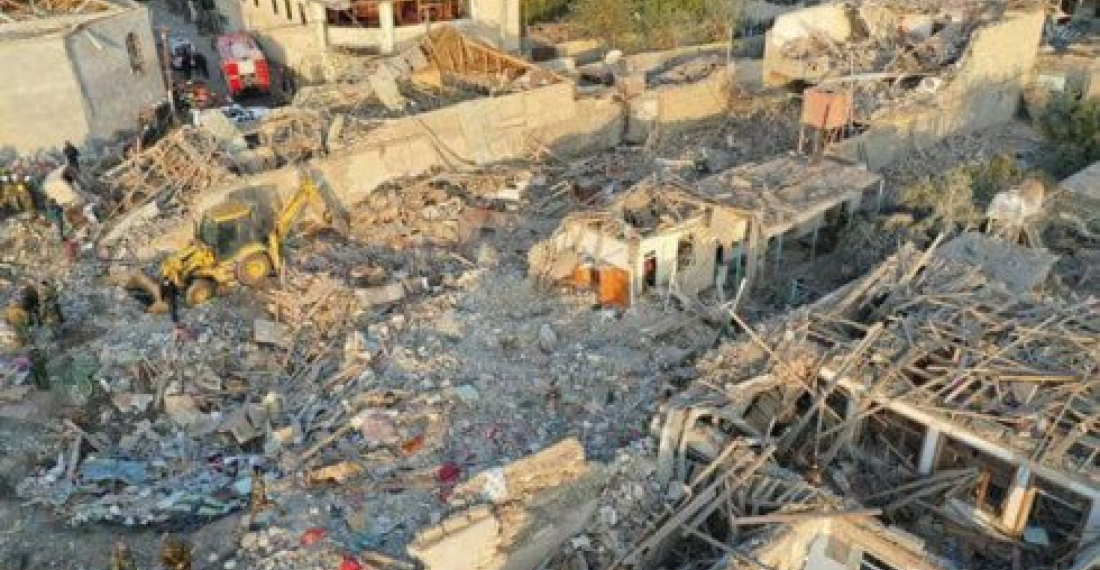Update 2 18 October 1300 CEST (1500 Baku/Yerevan)
The Armenian government, on Sunday (18 October) issued a statement deploring the EU statement on the missile attack on Ganja. "Armenia deplores this one-sided, biased and selective statement, which gives Azerbaijan “clearance” to continue breaching with impunity the international law, including the international humanitarian law and international customary law", said a statement issued by the spokesperson of the Ministry of Foreign Affairs in Yerevan. "The European Union has, to date, failed to clearly and explicitly react to these ultimate manifestations of war crimes committed by Azerbaijan with direct involvement of Turkey including through transfer of foreign terrorist fighters from Syria and Libya, and disregarded the existential threat and grave violations of the right to life of Artsakhi people, as well as the severe humanitarian crisis evolving in Artsakh" the statement said.
_________________
Update 1 1545 CEST (1745 Baku/Yerevan)
The European Union has condemned last nights' bombing of the Azerbaijani city of Ganja. A statement by Spokesperson, Peter Stano, issued on Saturday afternoon (17 October) and posted on the website of the European External Action Service said:
‘‘The European Union deplores the strikes on the Azerbaijani city of Ganja during the night of 16-17 October resulting in civilian loss of life and serious injury. All targeting of civilians and civilian installations by either party must stop. The ceasefire of 10 October must be fully respected without delay.''
______________________
For Armenians and for Azerbaijanis, in their home countries or overseas, these have been a difficult three weeks.
The war that started on 27 September appears no closer to ending, despite an attempt to have a cease fire.
Over the last twenty four hours both sides reported intensive fighting. Armenians say that overnight the town of Stepanakert, the administrative centre of Nagorno-Karabakh, was again bombed. Armenia says three people were injured in the bombing.
On its part Azerbaijan has reported another hit on a densely populated civilian area in its second largest city, Ganja, which is way away from the conflict zone. Women, children and old people were among the 13 people killed and many others are injured or missing. Azerbaijan says that that the number of civilians killed was now 60 and 270 were injured since September 27. In addition, 327 civilian facilities, 90 residential buildings and 1,704 houses were damaged. Azerbaijan is not giving the number of military casualties, but given the nature of the fighting it is expected that the numbers will be high.
In the attack on Ganja, the Azerbaijan-Georgia power transmission line was damaged. According to the Azerbaijani energy provider, Azenerji JSC the strike in the direction of Ganja caused an accident on the Samukh-Gardabani 500 kV overhead power line. The company said it had now repaired the damage.
Azerbaijani president Ilham Aliyev made a television address on Saturday morning (17 October) during which he said that the town of Fizuli and neighbouring villages had been liberated. Aliyev said people should be aware the Fizuli was completely destroyed during the period of Armenian control, and that there was not one single building standing. He promised that his government will rebuild the town so that its people could return to it.
Diplomacy is working behind the scenes, but the international community appears indecisive in terms of what the next steps should be, or even who should take them. Unconfirmed reports say that the United Nations Security Council will meet on Monday (19 October) for informal consultations at the request of the three OSCE Minsk Group co-Chair countries - France, Russia and the United States.
There are also reports of intensive diplomatic contacts between Russia and Turkey. Turkey continues to profess full support to Azerbaijan. The Russian newspaper Kommersant yesterday listed the nature of the Turkish military support for Azerbaijan, including advisers and equipment. The newspaper also alleged that Turkey was supplying Azerbaijan by means of flights through Georgia.Georgia has now closed its airspace to all military flights.
A statement by the Georgian foreign ministry said: "Georgia has closed its airspace for military flights and we have publicly stated about it. As for civilian and humanitarian flights, Georgia is sincerely fulfilling its international obligations in this direction. However, we would like to clarify that these types of flights do not require special permits and civilian flights in the airspace are carried out on the basis of notification and provision of relevant information". "If there is a violation and there is strong evidence, Georgia will react harshly and violators will be held accountable under international law," the statement said.
source: commonspace.eu with agencies
photo: Destroyed buildings in Ganja







